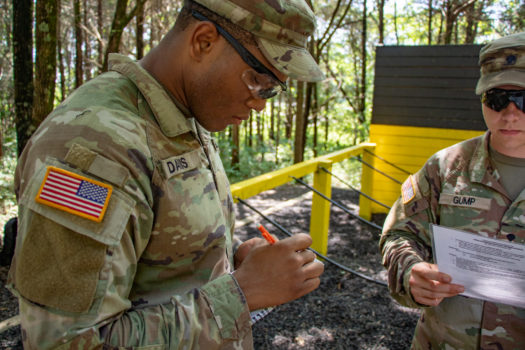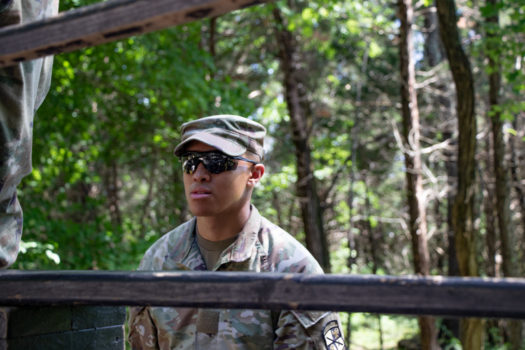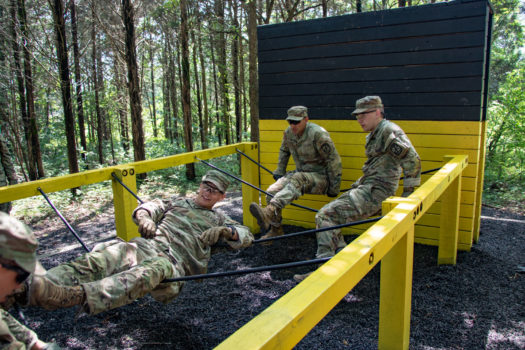FORT KNOX, Ky. – Cadets from 5th Regiment, Advanced Camp learned about teamwork and leadership while completing their field leader reaction course training, Fort Knox, Ky., June 25, 2023.
Cadets train on the FLRC, working together to solve problems and complete simulated missions on various obstacles.
Maj. Brian Alexander, professor of military science, University of Massachusetts Amherst, said the course helps Cadets learn to delegate tasks and trust their teammates, as a leader.
“The field leader reaction course is important because it introduces complex problem sets to these small unit teams, and it requires these Cadets to kind of think outside of the box, and there’s a physical component and a complex mental component, sometimes even a physics component like this obstacle here,” Alexander said.

The obstacle Alexander mentioned has two platforms connected by a cable. Cadets must find a way to get themselves and a simulated casualty from one platform to another using the cable without touching the ground.
“It forces them to work their way through these complex problem sets and engage their fellow leaders; the goal is to have them solving along parallel lines of effort, so that they’re not one dimensional and trying to micromanage everything,” Alexander said. “They have to trust the people next to them. They have to delegate and push some of that responsibility onto their team, ultimately making better team leaders and eventually better second lieutenant officers in the United States Army.”
Cadet Princeton Davis, Sam Houston State University, also spoke about the importance of delegation in leadership.

“A thing I’ve learned about leadership is always be willing to allow people to help you, so you don’t have to do it all on your own,” Davis said. “You can always delegate things. It just makes things more efficient, so you won’t get burnt out.”
Cadet Jaylon Berrien, University of Alabama in Huntsville, learned about teamwork and how it relates to leadership during his time on the FLRC.
“I have learned that listening is the most important skill, especially in a leadership position,” Berrien said. “You give your idea, but also take in all the information from your team because sometimes somebody on your team might see something that you don’t.”

Teamwork is very important during the FLRC, but as Davis noted, teamwork does require some flexibility.
“Different people react to different situations differently, and you have to adapt to people’s personalities,” Davis said. “Help them be a better them, and sometimes, I have to check myself as well, sometimes just getting upset and frustrated with people, just checking myself.”
Part of the FLRC is a chance for different squad members to practice leadership. Davis led his squad on an obstacle, which consists of a series of cables strung between two planks, and a tall platform. Cadets must make it across the cables and up onto the platform without touching the ground or any parts of the obstacle painted yellow.
“My experience [as a leader] was really good, just getting to walk people through certain steps,” Davis said. “[My] squad really trusted me. It was a little difficult trying to figure it out, but we came together, put our heads together and came up with a system that worked.”

Berrien offered some advice to other Cadets, who are going to face the FLRC.
“I would give them the advice of listen first, and definitely utilize the one thirds, two thirds rule: one thirds planning [and] two thirds execution,” Berrien said. “So take that one third of your time at the beginning and fully take in the situation and fully plan it out. Because one issue, that my team specifically has been running into, is we have been taking the minimal amount of time to plan, and we’re just trying to execute, and although we have completed about half of the obstacles we were faced with, we have also failed the other half because we have wasted our time.”
Davis emphasized the importance of listening to teammates during the training.
“Be very flexible,” Davis said. “Don’t give up and just be open to ideas from your squad members. Trust them.”
Listening is an important skill for teamwork, and for growth in leadership, as Berrien advised his peers.
“One other tip that I would give to all the Cadets is: be a sponge,” Berrien said. “Take in all the information that you can, never go into anything thinking that you know everything, because I guarantee you don’t. Take in all the information you can, especially from the senior NCOs [noncommissioned officers], who have been in just about as long as we’ve been alive, so definitely take in all the information you can and use that in your future.”




